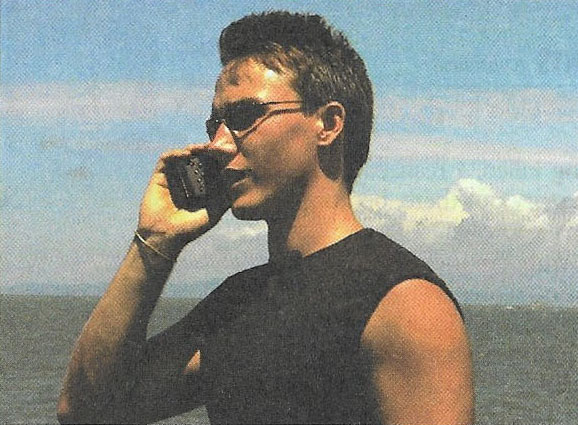
The War On Sharks
Captain Watson radioed the Varadero, ordering that it immediately stop processing sharks. But the fishermen defied him. The confrontation resulted in the Warrior and the Varadero colliding rails, after which the fishing captain surrendered. "We hauled him in [for arrest] under the instruction of the Guatemalan government," recalls WAtson, whose agents sand the bulk of Iceland's whaling fleet in 1986. The Warrior is customized with "can openers," metal spikes extending out from her lower bow that can peel open another ship's hull, and its operations are credited with ending pirate whaling in the Atlantic.
Watson might have claimed the cooperation of the Guatemalan government, but the morning after he seized Varadero he received word via radio that a Guatemalan gunboat was on its way - to arrest him and his crew.
"The Varadero crew accused us of shooting at them, which we didn't do," says Watson. "Obviously what had happened is bribes had passed hands. We were doing the government a favor and, next thing you know, we were the bad guys...I got charged with eight counts of attempted murder."
Watson and his crew were put under house arrest aboard the Warrior, docked in Puntarenas, by the Costa Rican government. "This happened despite the fact that the president of the country had invited us there," says Stewart. For weeks, the Warrior sat in port as the crew awaited prosecution. Stewart's underwater filming dreams were crushed, replaced by a nightmare of international legal wrangling. Until he realized he was in the middle of a fascinating story.
To find out why the Costa Rican judicial system was pinning an attempted murder conspiracy on them, Stewart absconded from the Warrior and went undercover. He received an insider's tip that the Taiwanese mafia (the "Shark Fin Mafia") was running an underground operation in the private dock area of Puntarenas, outside the scrutiny of public port inspectors. Shark fins all over Asia were being traced back to Costa Rica, where the Taiwanese land and process their catch. This was allegedly sanctioned by certain Costa Rican officials between 2002 and 2006, when former President Abel Pacheco was in office. Stewart was able to film "factory after factory" with thousands of fins drying on the roofs before being chased away by gunweilding goons.
When Stewart re-boarded the Warrior, Watson decided to flee the country and the bogus charges. With the Costa Rican Coast Guard pursuing and threatening machine-gun fire, the Warrior made it out into international warriors.
The ship moved on to the Galapagos, where Stewart was anxious to film hammerhead sharks. More disappointment waited. "Instead of finding hammerheads in all their majesty underwater, I found hundreds of them dying on 60 miles of illegally set longlines," says Stewart. "It opened my eyes to the fact that, even in the most protected areas on the planet like the Ecuadorian National Park and a World Heritage Site, sharks are being killed. I realized I needed to get this story out there, because people just don't know what's happening."

The Varadero incident helped create international media attention and public outcry. Thousands of Costa Ricans rallied against shark finning in the streets. Even so, foreign industrial vessels, mostly Taiwanese disguised under different flags, continue to land shark fins in Costa Rica and other pockets of Central America. But there have been recent gains, owing to a new Costa Rican government that is open to legal reforms put forth from locally based nonprofit groups, including Mar Viva and PRETOMA. "Of 50 international flag vessels that landed shark fins in Costa Rica between 2002 and 2005, now less than 10 land per month," says Randall Arauz, president of PRETOMA, a marine conservation organization working to promote sustainable fisheries policies in Central America.
Costa Rica is now leading a legislative process that will require all international fishing vessels to bring sharks into port with their fins still attached. Says Arauz, "Most of these vessels have moved to other nations such as Guatemala and El Salvador to land their products, and that's why it's important to get the fins-attached requirement as a regional and global policy."
The multibillion-dollar shark industry is alive and well, controlled by Taiwan but fueled by China-where shark fin soup is considered a delicacy and a status symbol worth up to $400 a bowl. The fins are worth 100 times more by weight than simple shark meat in Asian markets. Worldwide, scientists estimate that 100 million sharks are killed for their fins annually.
But Stewart, who spent four years making the film, shooting in 15 countries, has witnessed change in Asia. "Young people aren't into shark fin soup at all. It's mostly the older people," he says. "There's a big movement on the ground in China against shark finning and against the production of shark fin soup. There are 'Say No to Shark' campaigns happening. And film stars such as Jackie Chan and other big asian celebrities are speaking out against it as well."
CONTACTS:
Savingsharks.com; Sharkwater (opens everywhere November 2), www.sharkwarter.com
Client
E Magazine
Date
November/December 2007